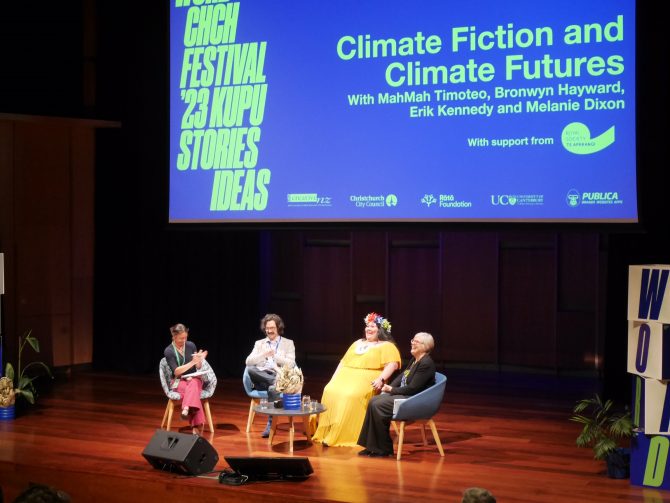On Thursday evening at The Piano, environmental anthropologist MahMah Timoteo, climate and sustainability writer and political scientist Bronwyn Hayward, and poet and editor Eric Kennedy took the stage for a discussion of writers and writing in the face of a changing climate. A wide-ranging conversation with Melanie Dixon unfolded, with a few of the many insightful moments outlined below.
On the importance of telling stories about climate change
For Erik, stories can illuminate how it feels to live through something, and can resonate with audiences in a way that stark data cannot.
MahMah made the point that climate change impacts marginalised communities the most - and so their voices and experiences need to be showcased.
Bronwyn described science writing as bearing witness, of recording things that she hopes will be helpful in the fight to come.
On the responsibility of writers to tell stories
Bronwyn talked about the problem of the language used in so much of the writing about climate change - that it assumes knowledge on the part of its readers which can serve to exclude many. Another issue she highlights is that of individualisation of the issue, and called for the need to turn toward collective solidarity, empathy, and community in the face of a climate changed world, and here storytelling can be a major link.
MahMah mentioned the problem of the Eurocentric discourse around climate change, and the importance of accessibility across communities and cultures.
For Erik, "making hope possible, rather than despair convincing" is something writers can aspire to.
Art as activism
MahMah discussed artmaking that doesn't perpetuate ideas of marginalised communities as victims. They also talked about the importance of dismantling and disrupting white supremacy, trusting communities to speak for themselves, and allowing them to lead and be in spaces in non-tokenistic ways. "We're not people of small islands, we're explorers of vast oceans".
Erik talked about the poetry and the book of poetry by Aotearoa authors he recently co-edited - he described how climate poetry can be hopeful and engaging (an example of one poem which used gallows humour to this effect was read), and the potential for art to activate a sense of agency.
Bronwyn talked about the need for considered framing of climate change as an issue - it is an existential crisis, but it isn't the only crisis. Tackling it head on can be a burden, and art has to come in sideways.
What came through strongly in the discussion was the need for inclusivity of voices in the stories that are being told, the consideration of lived experience of those not your own, and for more thoughtful, exciting, resistance conversations around sustainability, de-growth, and working on visions for a better world. The role of reading and writing in this is major - linking, synthesising, describing, connecting.
Finally, in response to a question about coping with climate anxiety, each panellist shared what they do to decompress. I was charmed - Bronwyn likes to make miniatures with a miniature club here in Ōtautahi, Erik throws himself into the ocean all year round, while MahMah has downloaded Duolingo and is learning German!
Find out more
- WORD Christchurch website and 2023 programme
- Follow @WORDChCh on Twitter
- Follow WORDchch on Instagram
- Like WORD Christchurch on Facebook
- Our WORD Christchurch 2023 page




Add a comment to: WORD Christchurch 2023: Climate Fiction and Climate Futures